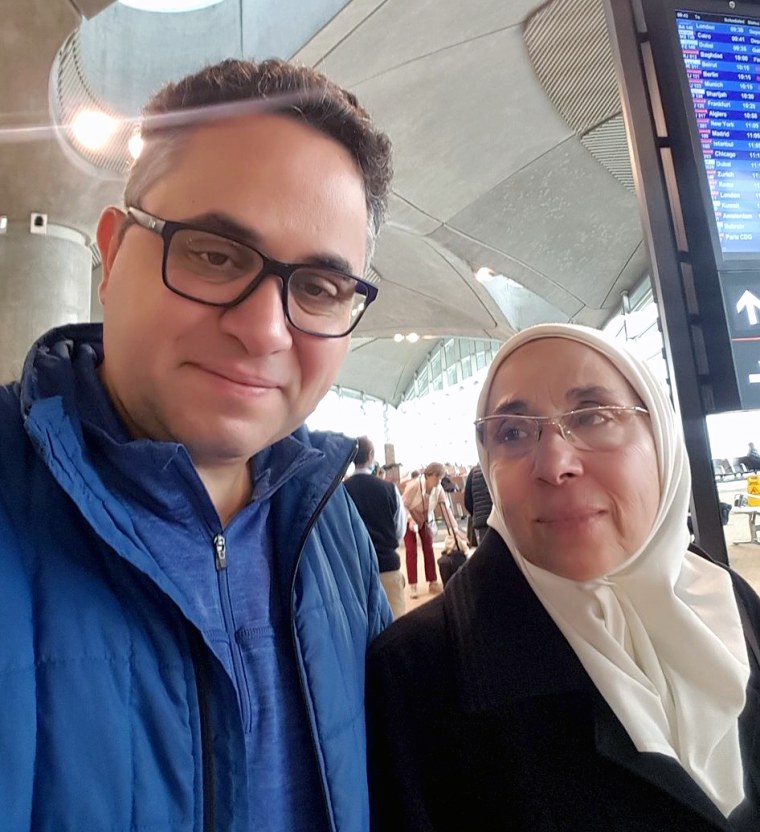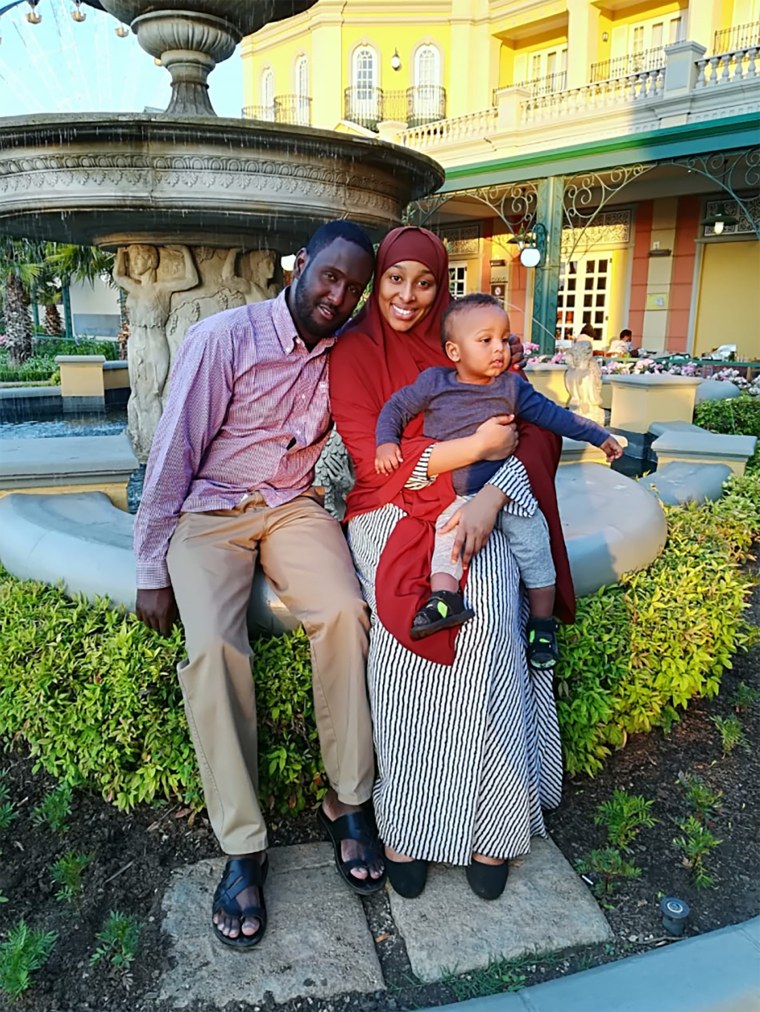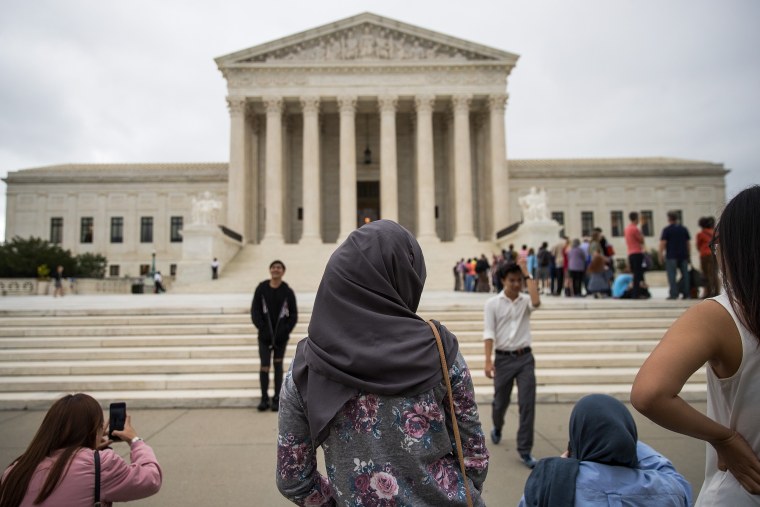Najib Adi has been having trouble sleeping.
Adi, who immigrated to the United States in 2002 and is a U.S. citizen, is worried about his mother, Mona Nasri, 72, who is desperate to flee her home in Damascus and join him in the U.S.
The Syrian capital has seen bombings and chemical attacks since the country’s deadly civil war began in 2012. After nearby explosions, the exterior of Nasri’s home is crumbling, while electricity, drinking water and propane are in short supply. She suffers from anxiety and arthritis, but it’s hard to get treatment because many doctors have fled.
“Damascus is hell on earth,” said Adi, 46, who owns a dental practice in Virginia. “I need to get my mother out of there.”
With Adi’s help, Nasri petitioned for a U.S. visa. But first she needs a waiver, because Syria is one of the countries targeted by President Donald Trump’s travel ban, the others being Libya, Iran, Somalia, Yemen and North Korea, plus some people associated with the government in Venezuela.

Nasri has heard nothing since she requested the waiver more than 15 months ago and is losing hope of ever making it to the U.S.
The mother and son are among thousands of people who have been kept apart from relatives in the U.S. since Trump introduced the travel ban days after his inauguration, initially targeting only Muslim-majority countries.
Out of nearly 38,000 visa applications from the targeted countries that the State Department reviewed in the first 11 months the ban was in effect, only 6 percent received a waiver, according to Sen. Chris Van Hollen, D-Md., a critic of the ban, who released the figures to NBC News on Thursday after receiving them from the agency.
The State Department has not said how many people, like Nasri, are still waiting for a decision. The announcement of the travel ban in January 2017 drew thousands of protesters to the country’s airports, and the subsequent legal fight over the ban drew headlines, but the fallout from the policy has largely unfolded out of view.
Those who have been denied or are still waiting include husbands seeking to join their wives in the U.S., fathers who have missed their children’s births, and international students who have been accepted to American universities. Some say they feel forgotten amid the focus on the immigration crisis at the southern border.
"I think the genius of the administration’s different iterations of the ban moved the fight from the airports in the U.S. to far, far away in consulates abroad where nobody sees them on a day-to-day basis," said Sirine Shebaya, an attorney for Muslim Advocates, a civil rights group in Washington and the lead litigator on a class-action lawsuit against the ban.
Shebaya added, "People have forgotten that the Muslim ban is actually fully 100 percent in effect right now."
The lawsuit alleges that the process of applying for waivers is a “sham” and violates the rights of applicants. People are being denied waivers at consulates in the affected countries without ever being told what information they need to submit in order to be considered, Shebaya said.
A State Department spokesperson said the agency does not comment on pending litigation. The next hearing in the lawsuit is scheduled for April 11.
The Trump administration has defended the travel ban as essential to national security and has pointed to the visa waiver process to show that it is still possible for some people from the targeted countries to enter the U.S.
The Supreme Court upheld the ban in June 2018, based partly on the administration’s visa waiver process.
The waiver system is meant to issue exceptions based on three broad considerations: whether denying entry to an applicant would cause undue hardship; whether the applicant represents a security threat; and whether entry would be in the national interest.
But in practice, nationals from the countries affected told NBC News that they are being denied even though they meet the criteria, or their visa applications have been stalled for so long that it amounts to a denial.
“The Administration repeatedly swore to the Supreme Court and the American people that this was not a de-facto Muslim ban and that there was a clear waiver process to ensure fairness,” Van Hollen said in a statement. “That couldn’t be further from reality.”
Adi, one of the 34 plaintiffs in the lawsuit, petitioned for a family-based immigrant visa for his mother in February 2017. The petition was approved and her interview was scheduled for that December at the U.S. embassy in Amman, Jordan, since passports and visas to the U.S. are not issued in Syria.
Adi traveled to Jordan to accompany Nasri to the interview and said the officials asked no questions that would determine her eligibility for a waiver under the guidelines set by the administration.
Since then, Adi said officers at the embassy have repeatedly told him that his mother's application is still being processed.
"I'm desperate at this point," Adi said. "What evil have we committed to deserve this?"
Less than 2,700 waivers have been granted, according to the most recent number released by a State Department official. Some of them are in dire situations that caught the attention of advocates and the media, including a Yemeni woman whose 2-year-old son needed treatment for a deadly brain condition; an 10-year-old Yemeni girl with cerebral palsy who couldn’t get medical care in her home country; and an Iranian man who was a bone marrow transplant match for his ill brother.
Shebaya noted that these “extreme” cases of people with urgent medical needs are the only ones she has seen receive waivers.
Others have had to wait.

Sudi Wardere, 29, who is Somali-American, said her biggest concern is making sure her husband doesn’t miss the birth of their child, again.
A Washington state resident, Wardere has been living apart from her Somali husband, Bashir Tahlil, 38, for more than two-and-a-half years. Wardere, who works as a child care provider, gave birth to their first child in May 2017, while Tahlil was thousands of miles away in South Africa, waiting for his visa to be approved.
“The last time I saw him was when I went to introduce him to our son for the first time in October,” Wardere said.
Tahlil had his visa interviews early last year in South Africa and requested a waiver to the travel ban shortly afterward. He’s now been waiting more than a year.
Wardere said that all they can do now is hope.
“It has been so many years,” she said. “Now I’m five months pregnant and can’t help but think that I am lying to myself to believe he will get to be here for the birth.”
